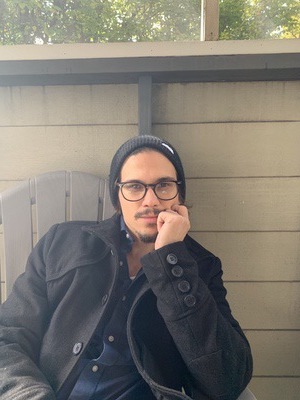We are somehow on the topic of Shakespeare
in this dinged-up Marta shuttle with its tires perpetually
kissing the potholes, and the driver, whose name
I’ve been too afraid to ask, though he’s ferried me daily
like a blue-eyed Charon down the blacktop rivers
of Dekalb and Moreland says now lemme ask you something:
to be or not to be, the hell does that really mean?
This all started with a phone call: the young girl in front
of me discussing with her mom her upcoming role
in Hamlet, the driver, overhearing, asking about
Elizabethan English, his hands dropping the turn signal
as if loading a bolt-action rifle. To be or not to be
the girl repeats, letting the words rattle
in her upper rafters like a possum
scratching through an attic: I think it has something
to do with existence she says, and I want to stay silent,
I really do, but I blurt suicide, he’s contemplating suicide,
to which the driver responds now that’s some dark shit,
and I nod and stare into the rear-view mirror and connect
with the driver’s spark-metal blue eyes
as if in that moment we’ve shared the train stations
with their long black tunnels, shared the work shirts crumpled
on bedroom floors, their polyester skins the human skins
of mindless work on these March mornings gray and splotchy
as the sidewalks littered with forties. It’s a shame
he says that suicide is so prevalent, and I nod and say
yeah, some dark shit and the girl in front nods
though she can’t be more than sixteen,
her backpack a shrine to The Jonas Brothers,
their smooth faces smiling across her pink Jansport,
her purple lipstick light as a starling, and I want
to say something philosophic but instead look out
the window at a homeless man wearing a green wig
and a pigeon gnawing a chicken bone and the orb
of the still-mute sun rising slowly the way
my father did each morning to rock by the sliding glass door,
his left-brain paralyzed by grief, though his right-brain
understood to be or not to be better than anyone,
and he paused every now and then to look
into the dark ocular pines of Mississippi, a cup
of coffee cooling in his palm like his wife splayed
on that dirty street outside of Memphis,
and that most human question rising like the last ghosts
of steam from his mug, his body inhaling those six words
as he waited each morning for his two young sons
to stumble with his answer down the stairs.

